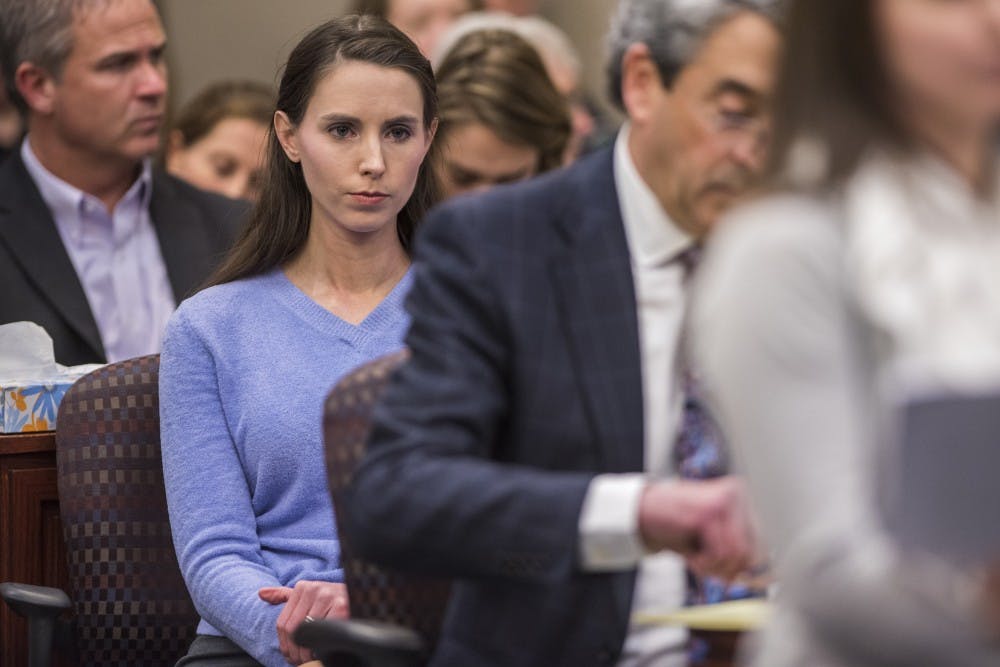When an allegation of sexual misconduct by Mel Tucker was made public, Michigan State University moved swiftly to distance itself from the then-football coach.
Within 24 hours, the athletic department instructed maintenance employees and outside vendors to remove images of Tucker from the walls of Spartan Stadium and the football building, emails show.
MSU IT took down web pages referencing the coach, the emails show.
And, MSU’s communications department enlisted the help of two crisis management PR firms, according to the emails.
These behind-the-scenes moves — revealed by emails obtained through public records request — add to a growing list of steps MSU took quickly to distance itself from Tucker in the aftermath of his misconduct coming to light.
Within hours of the news report first revealing the allegations, Tucker was suspended. Two weeks later, he was fired. That was all before the MSU investigation into his conduct concluded.
MSU has argued the brisk response represents a commitment to accountability for those who break policies on sexual misconduct.
At the time of his suspension, interim president Teresa Woodruff said the response represented an improvement from the university's troubled recent past with sexual misconduct.
"This morning's news might sound like the MSU of old," Woodruff said. "It was not.”
Not everyone agrees.
Rachael Denhollander is a Kentucky based attorney who, in 2016, became the first woman to publicly accuse disgraced ex-MSU doctor Larry Nassar of sexual assault.
Her detailed account of his abuse opened the floodgates for hundreds of similar stories, prompting numerous investigations of Nassar and those who enabled him, and inspiring a broader cultural reckoning at MSU.
She believes the lapse between MSU receiving information about Tucker’s conduct and the university acting on it is “sadly similar” to what she and other survivors of Nassar’s abuse saw.
“This is the exact same problem we had with our case,” she said. “It’s heartbreaking, because we’re watching others go through similar dynamics that we went through.”
The information cited in Tucker’s firing — that he admitted to a sexual relationship with a team vendor — was known to university investigators months before his employment was challenged.
MSU’s leaders won’t say what was done in the nine months between the university receiving the allegations and them becoming public.
Denhollander believes the Tucker case was handled the same way Nassar was: “Different authority figures each had a piece of the puzzle,” but a lack of communication prevented the proper action from being taken until public pressure mounted.
MSU officials have defended the timeline, saying communication between the Title IX office staff investigating the case and university leaders empowered to take action would have caused interference and endangered survivor privacy.
Denhollander disagrees.
“The idea that the board and administration’s ‘hands are tied’ because of survivor privacy is just a complete misunderstanding of what that means,” she said.
Support student media! Please consider donating to The State News and help fund the future of journalism.
It’s not an adherence to best practices, rather a “poor communication channel that’s designed to shield leaders from responsibility,” she said.
Since coming forward with her allegations against Nassar, Denhollander has been tapped to assist numerous major universities on how they can better handle sexual violence.
MSU is the one school that seems to never take her advice, she said.
For years, Denhollander has asked MSU’s board to consider alternatives to the current model of handling reported misconduct, where investigators are largely walled off from other MSU officials.
She advocates for more communication between the MSU investigators handling the cases and the university leaders who could take action.
She’s faced years of stonewalling, and believes recent developments signal a lack of commitment to change.
In December, the board voted to release thousands of privileged documents relating to MSU’s mishandling of Nassar’s abuse to investigators with Michigan's Attorney General. The vote ended a years-long, controversial withholding of the documents.
Denhollander said that move is a "smokescreen" designed to avoid real accountability for MSU.
"They say, 'We did what we're supposed to do, we released the documents' and wash their hands of it," Denhollander said. "But I think many members of the board know full well that turning them over to the AG is not by any stretch of the imagination sufficient."
The attorney general's jurisdiction is limited to criminal activity, but the "vast majority" of what's going wrong at MSU isn't criminal, Denhollander said.
"We saw the same dynamics as (Nassar) replay with the Tucker situation," Denhollander said. "In order to fix those dynamics, we have to go beyond the question of 'What's criminal?' to the question of 'What is the best policy and practice?'"
To do that, Denhollander believes the university should allow an independent ethics and compliance firm to take a holistic look back at what’s allowing things to keep going wrong.
She's faced years of stonewalling from MSU's board, but hopes pressure could mount for them to change their minds.
“Change is going to take real moral courage on the part of the board, that’s really what it has to be,” she said. “It’s going to take courage to finally make a decision and say enough is enough, we are going to do whatever it takes to get this right.”
A delicate balance
Before the Nassar scandal, MSU’s Title IX investigators actually had too much communication with those outside their office, Liz Abdnour, a former MSU investigator, said.
During her time as a Title IX investigator from 2015-2018, Abdnour said then-president Lou Anna Simon would have monthly meetings with the Title IX office director where she “would want to know everything that was going on” with each case.
That got thorny when cases involved those close to Simon.
While interviewing staff of The Cowles House for a separate case, Abdnour said student workers told her that a relative of Simon’s was sexually harassing a staff member.
With the Title IX office director’s permission, Abdnour tried to conduct a separate investigation into the relative’s conduct.
“Then I got a voicemail from (Simon’s) secretary saying I needed to stop and not investigate,” Abdnour said.
Abdnour voiced concerns about the presidential interference to her director, who met with Simon to discuss the matter before telling Abdnour to “kill the investigation,” she said.
Simon would later be criminally charged for her role in allowing Nassar’s abuse to go on for so long, though the charge was eventually dismissed.
Since Nassar’s abuse became public, Abdnour said she believes the university has “overcorrected” and completely walled off the Title IX office, hampering its effectiveness.
“I think the whole situation with Nassar caused MSU to go into a tailspin too far in the other direction,” Abdnour, who left MSU in 2018 to start a civil law firm and advise other universities on Title IX compliance, said.
Some communication between Title IX investigators and other departments at MSU helped investigators more fully police conduct, Abdnour said.
For example, Abdnour said she once encountered evidence of embezzlement while investigating discrimination. That couldn't be handled by a Title IX investigation, but it was addressed by other parts of MSU’s administration through information-sharing.
“I think MSU actually had a good system, except for the president and general counsel having this veto power over investigations,” Abdnour said.
Lacking the necessary “tools to police conduct”
Bradley Dizik, an executive vice president and compliance expert with compliance firm Guidepost Solutions, said he believes MSU lacks accountability measures outside of Title IX, forcing leaders to rely solely on the slow, tedious process.
“MSU keeps running into issues because they don’t necessarily have the tools to police conduct outside of Title IX, so they try to throw everything into Title IX,” Dizik said.
Guidepost recently did an audit of policies and practices for limiting sexual misconduct at American Association of Universities schools, Dizik said. Compared to its peers, MSU lacks many of the important mechanisms for policing employee conduct, he said.
Contact the reporter at Alex.Walters@StateNews.com or (248) 979-5497
MSU is missing three important tools for curbing harassment and discrimination: broad codes of conduct, an independent compliance office, and more ways of protecting people from retaliation for reporting all manners of misconduct, he said.
Some units within MSU have codes of conduct defining prohibited behavior, but there are not university-wide policies governing conduct. That leaves supervisors helpless when there is questionable conduct outside the bounds of what’s explicitly prohibited under the Title IX statute, Dizik said.
“Title IX is very rigid, it’s a lot of very rigid statutory requirements,” Dizik said. “It doesn’t capture all sexual misconduct.”
In the Tucker case, MSU was able to fire him for cause pending the results of the Title IX office’s investigation because of morality clauses in his lengthy head-coach contract.
Without a university-wide code of conduct, similar dismissals couldn’t be executed for every employee, Dizik said.
MSU also lacks an independent office of compliance focused on making sure conduct policies are fully adhered to.
In the wake of the Nassar scandal, MSU did establish the Office of Audit, Risk, and Compliance. But, Dizik says combining the three functions defeats the purpose.
“It’s unethical for an auditor to audit any compliance program,” Dizik said. “(They're) not independent if (they're) also responsible for compliance. They should be completely separate functions.”
A large portion of a code of conduct or the work of a compliance office will have little to do with sexual violence, but the act of strengthening MSU’s reponse to all manners of misconduct will improve the university’s handling of sexual misconduct, Dizik said.
For example, Dizik said MSU lacks adequate anti-retaliation policies for types of misconduct other than sexual violence or discrimination.
Retaliating against someone for filing or participating in an MSU Title IX investigation can trigger separate investigations and discipline through the Title IX office or other MSU units.
But, there aren’t similarly rigid structures for retaliation against reporters of fiscal, academic, or athletic misconduct, Dizik said.
That may seem unrelated, but Dizik believes bad experiences reporting any manner of misconduct could affect the chance of someone speaking up when they witness or hear of sexual misconduct.
“Say you report research misconduct and you’re retaliated against and have a terrible experience,” Dizik said. “Are you likely to then report sexual misconduct when it happens?”
A different way at the University of Michigan
For a better system, look at how things are done at the University of Michigan, Denhollander said.
The process at UM gives the university’s elected Board of Regents frequent updates on cases involving high-profile employees, Denhollander said.
There are "boundaries in place" that keep the identities of survivors or whistle-blowers from the board, but enough information is relayed for the board to act on admitted wrongdoing or misconduct outside Title IX before the university investigation is complete, she said.
It’s unclear exactly how cases are deemed high-profile enough to warrant board oversight. UM spokesperson Kim Broekhuizen said cases are reviewed on a “case-by-case basis” but wouldn’t describe the specific criteria.
Denhollander — who advised UM’s board on the system — believes the process has enabled the university to better handle misconduct.
It does that by allowing the Title IX office to handle its statutory obligations while the board separately handles its reputational and fiduciary obligations — all without either group left in the dark on the other’s work, she said.
Simply put: Title IX investigators go about investigating, but when they turn up information that’s a clear-cut offense, the board doesn’t have to wait to act.
MSU’s board does participate in a certification process where board members review all reports of misconduct each semester, but, they aren’t given updates about the cases as they progress that could trigger action, according to a 2022 external review.
An example of the UM system in action is the recent firing of president Mark Schlissel over his inappropriate relationship with a subordinate, Denhollander said.
UM received the first anonymous tip about Schlissel’s behavior in December 2021, according to news reports. The board was quickly made aware of the allegations and the dozens of emails detailing the conduct. By Jan. 15, 2022, Schlissel was fired.
“They fired the president of the whole university in three weeks, over a holiday, because they were able to move that fast,” Denhollander said.
Had the information sharing system not been in place, UM’s board would have been in the same place that MSU’s board was with Tucker, she said. It would be in the dark during a lengthy Title IX investigation into a high-profile employee, unable to take action over what had already been found by investigators.
In another example, even more closely resembling the Tucker case, UM was able to fire its hockey coach for misconduct discovered in an ongoing Title IX case.
Information in a 2021 Title IX complaint against then-coach Mel Pearson led to a separate ethics investigation, the results of which were cited in Pearson’s eventual dismissal.
The Pearson case is “identical to the Tucker situation” because both involve a coach fired outside of Title IX for conduct discovered by a Title IX investigation, Denhollander said.
But, UM’s system enabled the university to act on the information turned up by a Title IX case as soon as the university was alerted to it, not only after it came out in the press, she said.
At MSU, “there’s not a clear communication channel so that the individuals who have fiduciary responsibility have enough knowledge to do anything about these things,” Denhollander said.
“Those are design flaws, and we can see that they’re not necessary if we just look at how they’ve handled things 50 miles away at UM,” she said.
The MSU board’s lack of agency over misconduct recently drove one trustee to resign.
In October 2022, Pat O’Keefe said that the limited board involvement at MSU left the trustees “pregnant with the information of the sexual transgressions of the faculty without a plan to remove the excrement from this campus.”
He then resigned from the board.
Denhollander said she understands his anger.
“It’s intensely frustrating to see horrible things happening and not be able to do anything about it,” she said. “But, that wouldn’t be the case if things were set up properly.”
A broader solution
The first step in making the necessary changes is allowing an unobstructed look back at what keeps going wrong, Denhollander said.
To do that, she suggests MSU’s board allow a qualified compliance firm to do a “robust assessment that would look at the structures, the policies, and the culture of the organization.”
This would be different from the numerous outside investigations the board has ordered in recent years, Denhollander said.
For those investigations, the board asks firms to detail individual instances where things have gone wrong. Dehollander’s proposed review would ask a firm to seek out the problems that allow things to go wrong in the first place, she said.
If Denhollander was in charge, she said she would ask the review to do three things: diagnose the systemic issues leading to mishandled misconduct, make recommendations for how to correct that, and, most importantly, create metrics to assess whether MSU is following the recommendations and making improvements.
The firm would do so with traditional methods — interviewing officials and reviewing documents to investigate the problem — but would ideally also include a “community engagement piece” that engages students, faculty, and survivors, Denhollander said.
“It could become a collaborative process of everyone working together to say ‘We’re gonna figure out what’s wrong and work together to fix it,’” she said.
The firm’s work would culminate in a publicly-released, written report.
Denhollander said she worked with MSU’s board to make her proposed outside review a reality in 2019. The board “got close,” but it fell apart at the last minute.
The sticking point, she said, was the “retroactive historical accountability piece.”
The board was comfortable with a firm looking at current policies and practices to find imperfections and suggest changes, but it didn’t like the idea of a full look back at what went wrong with Nassar and others.
The largest roadblock was Denhollander’s insistence that any outside review include a look at the thousands of privileged documents the board was then withholding from Michigan’s attorney general, she said.
The board has now begun releasing the documents to the Attorney General, but Denhollander believes the board will use that decision as "an easy way out, to not have to do a real review."
After the board voted to stop withholding the documents, Attorney General Dana Nessel told The State News that it was "better late than never," but stressed that her office will be limited by fading memories and fast-approaching or already-passed statutes of limitations.
Even if Nessel's can put together criminal charges, it won't be nearly enough to fix the problems at MSU, Denhollander said.
"The AG doesn't have jurisdiction to look into the vast majority of what we already know went wrong, much less write any sort of extensive public report to create transparency and accountability," Denhollander said. "So, is it necessary to investigate potential crimes? Absolutely. Is it sufficient? By no stretch of the imagination."
No action could mean more costly external investigations
If the board never agrees to an all-encompassing outside assessment, it's going to have to keep ordering individual outside investigations each time something goes wrong, Denhollander said.
“What’s the alternative, more external investigations?” Denhollander said.
In the last year alone, MSU has ordered outside reviews of the board’s Title IX certifications, the ousting of a business dean over his handling of sexual misconduct, the efficiency of the Title IX office, and the leak of a Title IX claimant’s identity. Each cost hundreds of thousands of university dollars.
They add to numerous other reviews the university has ordered in the last ten years, some of which were never publicly released.
On top of the reviews the university orders for itself, MSU is also the subject of seven ongoing department of education investigations for allegedly mishandling reports of sexual violence.
“They have poured so much money into poorly done assessments that lack transparency and accountability,” Denhollander said. “One robust assessment five years ago would have cost significantly less than they have now paid piecemeal for absolutely nothing.”
When MSU orders an outside investigation, the firm, scope and end product is chosen by the university.
The reviews give the appearance of accountability and transparency, but are largely set up to clear the university of wrongdoing, she said
The problem starts with the choice of firm, she said. Rather than using ethics and compliance firms, MSU opts for law firms with robust corporate defense practices.
“They’re picking defense attorneys to try to clean up their process, that doesn’t work,” Denhollander said. “I’m an attorney. I’m telling you that doesn’t work.”
The best example, she said, is MSU’s use of Quinn Emanuel.
The board has spent millions retaining the LA-based law firm to investigate the removal of a dean, keep records of that investigation from being revealed in court, and to personally represent the board’s chair in another outside investigation MSU ordered.
Denhollander is skeptical of the board’s use of Quinn Emanuel to evaluate its practices given the firm’s history of representing institutions in disputes against sexual assault survivors.
“They’ve picked Quinn Emanuel to do some of these assessments, well Quinn Emanuel is one of the top sexual assault defense firms in the country,” she said.
Most notably, the firm was recently tapped by the University of Southern California to defend it in lawsuits by survivors of sexual abuse by one of its doctors.
MSU’s board has also been unscrupulous in evaluating potential conflicts of interest by the firms retained for outside review, she said.
In 2014, before Nassar was publicly accused of misconduct, MSU ordered an outside investigation of its handling of sexual violence from the law firm Pepper Hamilton.
After Nassar’s yearslong, unchecked abuse became publicly known, pressure mounted for MSU to release Pepper Hamilton’s report. The university did not.
Then, in the wake of the Nassar scandal, MSU agreed to years of regular outside audits of its Title IX cases by the firm Cozen O’Connor.
That had the public appearance of a new firm stepping in to conduct a neutral review of things. The truth is more complicated, Denhollander said.
Some of the lawyers who conducted the Pepper Hamilton review of MSU left that firm and were hired by Cozen O’Connor in 2017, according to a company press release and online bios. They then conducted later Cozen O’Connor reviews of MSU.
“They were evaluating their own work product,” Denhollander said. “They should have never come back to do those assessments, because they were conflicted out. They had a vested interest not to find problems, because they were the ones that had already tried to find the problems earlier.”



